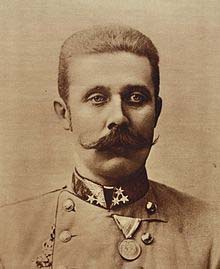
Archduke Franz Ferdinand
of Austro-Hungaria (1863-1914)
On June 28, 1914, Archduke Franz Ferdinand, the presumptuous heir to the Austro-Hungarian throne, was assassinated by a Serbian militant named Gavrilo Princip. This lead to a chain of events that ignited the powder keg of European mutual defensive pacts and triggered the first World War.
And war was never the same again.
Horses were replaced with mechanized, armored tanks for the first time. Radio was used to triangulate artillery bombardment without a direct line of sight. Land mines halted enemy advances. Air planes patrolled the skies for the first time and dropped bombs and rained machine gun fire onto soldiers. Chemical and biological weapons were deployed for the first time with horrendous results. War stopped being the close, personal, visceral evil that it had been since the beginnings of human history, and it became distant and impersonal. Armies could fight each other from a distance through crosshairs and scopes. War could be waged with bombs and machines at a global level with industrial killing efficiency.
When the dust had settled and peace had come, the nations of the earth were so horrified with what had transpired, that they declared this "the war to end all wars".
They were wrong.
They created the League of Nations in order to promote peace and cooperation.
They failed.
The terms of peace were harsh and made the defeated nations bitter and resentful towards the rest of the world. On the other side of the world, in Asia, nations that were just becoming industrial saw that these new technologies could make the entire Pacific Ocean their exclusive domain.
A mere twenty years after the Treaty of Versaille ended "the war to end all wars", the world was once again pulled into a global war on an even grander scale. World War II saw death on an unprecedented scale and culminated with the unleashing of the most terrifying weapon the world had ever known: the atomic bomb.
Mankind had finally created the power to destroy itself - and the world.
On this day, one hundred years ago, war changed forever.
The concept of a global conflict on the scale of the World Wars is absolutely terrifying to the modern world. Such a war would almost certainly result in nuclear exchange that would potentially turn the earth into an uninhabitable wasteland incapable of supporting human life. Yet the nations of earth (the United States in particular) still spend hundreds of billions of dollars, and countless manhours of work, research, and labor, creating new weapons, training new soldiers, and waging smaller-scale wars. People, groups, and nations all over the world still use violence as a tool for their own gains, even though they know full well what the consequences could be.
Will it ever stop?
"Every gun that is made, every warship launched, every rocket fired, signifies, in the final sense, a theft
from those who hunger and are not fed,
from those who are cold and are not clothed.
This world in arms is not spending money alone.
It is spending the sweat of its laborers, the genius of its scientists, and the hopes of its children."
-President Dwight D. Eisenhower (1956)
Let us all hope that the people of earth must never suffer through another world war again.